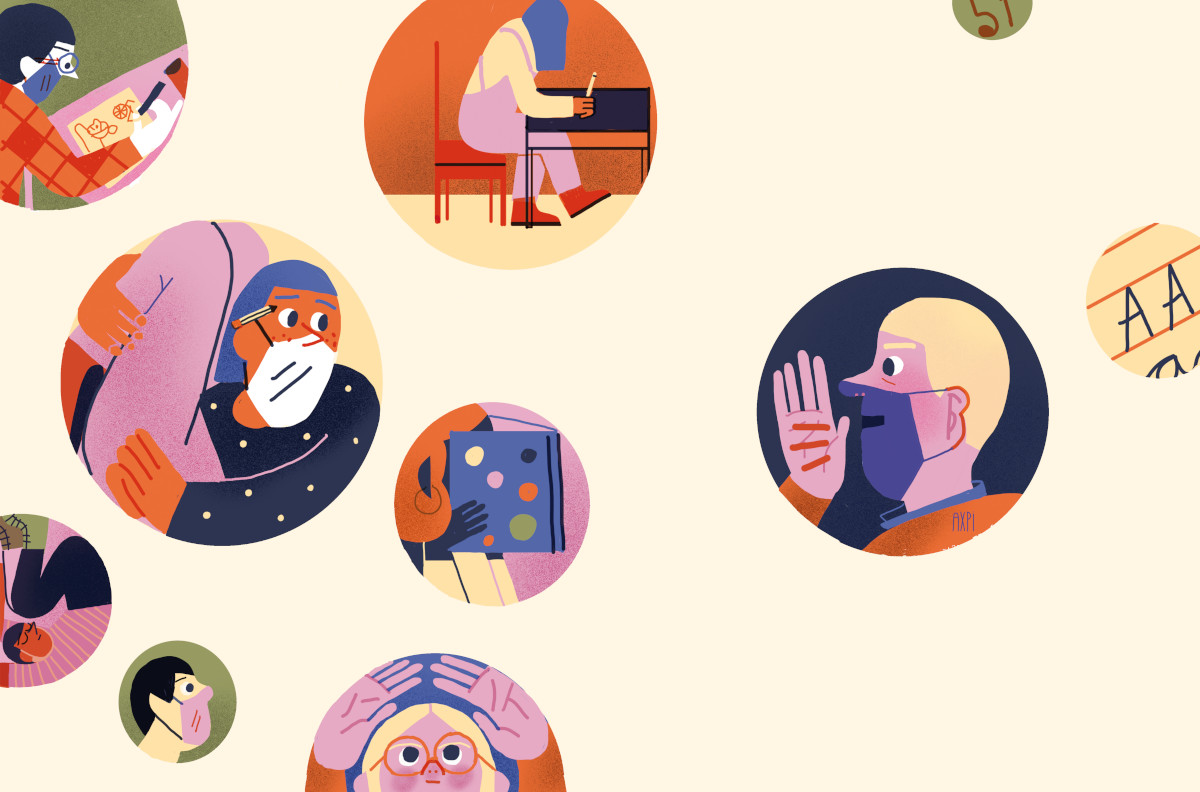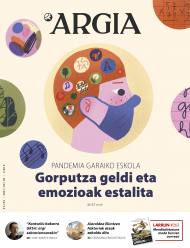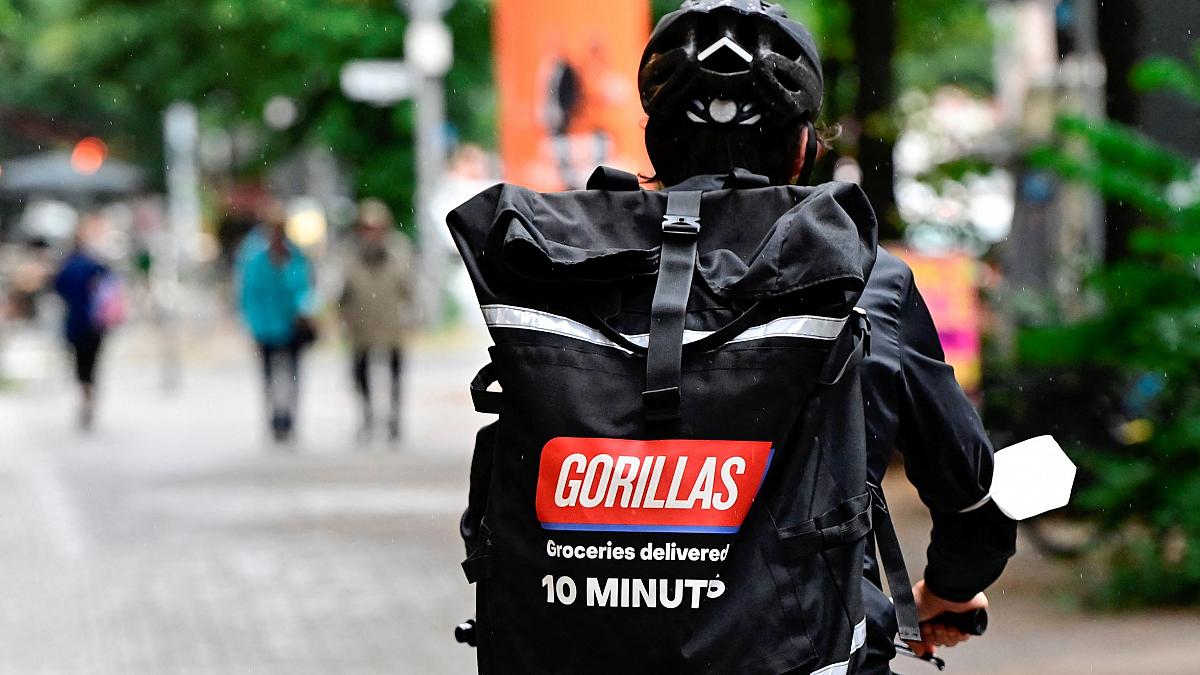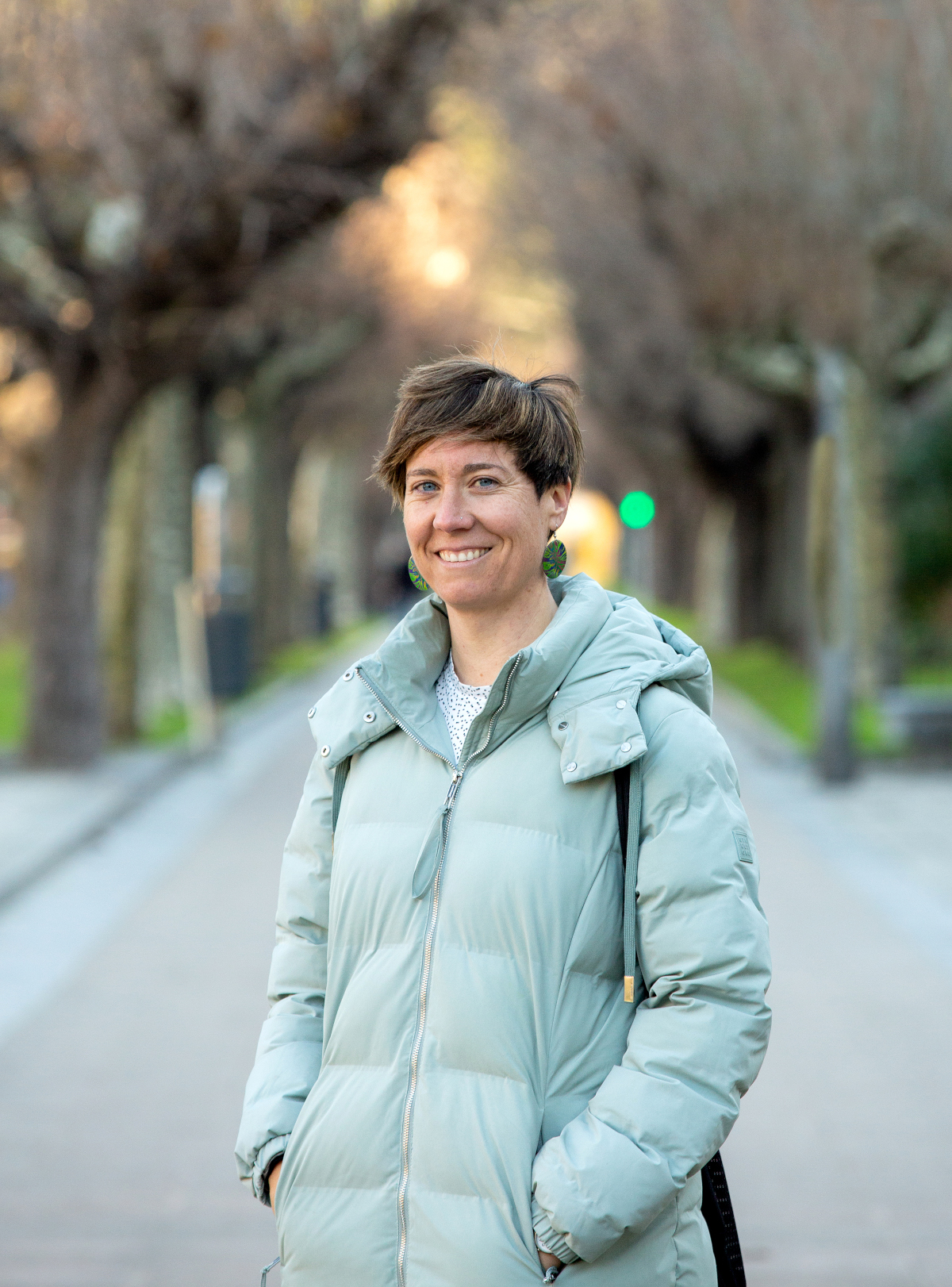How has the pandemic affected life within the classroom?
- The COVID-19 course is about to end. Students have had to learn the same resume with masks, distances, bubbles and dozens. The adoption of sweetening measures to compensate for health measures has not been present in the management plans: it seems that the body and emotional situations do not influence the learning process. How has the course lived within the classrooms? We interviewed two members who run school workshops: Stitxu Arozena, who works Bertsolarism, and Jon Ziarsolo, who deals with sexuality.

We head to two classmates who access the classrooms of many centers to take the temperature of this course. The Lotura Educational Association has been working on school sexuality for about 25 years. His colleague Jon Ziarsolo has served eight years in this activity: “Throughout the course we went from 40 to 50 schools and villages, from 1st grade to high school and vocational training. We teach workshops to students, teachers and parents,” he explains. Its activity is concentrated in Gipuzkoa and Bizkaia, visiting very small towns and large cities. Estitxu Arozena has been teaching a Bertsolarism workshop in schools since 1998 and in the 5th and 6th Primary of Navarra this program of 15 sessions is taught. Throughout the course, it has been present in 12 schools in Baztan, Malerreka and Bortziriak, mainly in small municipalities.
Each one has given us a very different description of this course. It is noted that the pandemic itself is living in a totally different way in every village, educational center and home.
Arozena explains that the fact of having reached the end of the course the centers live as a “victory”: “We have to remember where we came from: without the end of the previous course being face-to-face. When we started we had to get used to the measures, but when the course took the march, it did not go so badly. We would be signing this course last September.”
However, Ziarsolo has shown other emotions when reviewing the course: “This year has been a special year because new rules and decisions have been adopted that have influenced them. At the beginning of the course it was said that the use of kiss, distance, etc. are ‘anecdotal’, but it has been seen that they have not been anecdotal, that they are affecting very directly all children, adolescents and agents that form education in general. In our workshops, we work on sexuality, emotions, relationships between equals. In dealing with personal relationship issues, emotions have always been manifested, and this year we have seen negative emotions prevail. Children are sad, apathetic and seeing this on Elementary 1 is disappointing. The feeling that is most imposing among adolescents is anxiety and also sadness. That is, the joy, the joy, the feelings that at these ages are very natural, it is difficult to emerge”.
In this article we wanted to list the deficiencies that have been detected in classrooms throughout this year due to special circumstances. Being aware of them is an essential step in order to meet the needs of students. What has happened to Ziarsolo in several centers is significant: “The sexuality workshop begins by asking me “How are you?” and the students have answered me in more than one center “You are the first one who asked us”.
In the absence of movement, conflicts are rising
Ziarsolo continues to explain what causes discomfort in children: “What’s missing in Elementary is the movement. It is obvious. In the sexuality workshops, our way of working is very dynamic, because it is effective to work in different areas: group dynamics, etc. We cannot do that this year. Therefore, we use the word a lot, everyone has to be in their place without moving anywhere... The workshops have become very individual.” From a methodological point of view, the situation has been very demanding in this edition, and in most schools teamwork means “working each from your computer on a document we are building together”. Arozena has pointed out that “distance, absence of U-shaped classrooms and the fact that everyone is sitting individually in some exercises” also influences the work of Bertsolarism.
After receiving these kinds of classes, students go out to recess and there, Ziarsolo explains that the situation has changed: “In Elementary School we see that after going to recess they become crisped. It is evident that during this rest period they have not been released: in some schools the patio is limited by ribbons, divided by rooms, they are bubbles... At the end of the course, it is observed that they are left with the ball or some games to play, but until then nothing. They can't have contact -- this increases pressure and concern in primary school, because they need movement: sitting in the room requires a later time of distension. In the room this situation produces a lot of tension and then the body seeks a natural distension, that is, a pleasure. And if the school does not give it the possibility of distension, there are confrontations, especially when returning from recess, or in the evenings, when the day is getting longer. It’s obvious.” Ziarsolo underlines the need to boost the movement in Primary Education and in 1st and 2nd Compulsory Secondary Education: “We do not say that competitive sport needs to be done, but more external actions need to be promoted.”
Arozena has welcomed the rearrangement of the patio conditioned by this year’s situation: “Once dominated the ball, different ways of distributing space have been seen this year. Before, the students did some things in the yard, now others.”

Difficulties to work family and body
The sexuality workshop works on the family theme to show that the models are varied, both from the point of view of sexual tendencies and the number of members and roles... “This year we have found it very difficult to address this issue: on the one hand, there have been many misgivings and, on the other, many hours spent together in some families for decades and we do not know what situations have occurred in them... The family is a private space, but the children bring to school what they live at home, situations that appear in our workshops. When working with the family we have had to be very careful, because many sensations have arisen: there has been a lot of crying...”. In view of the difficulties faced by the children, especially at the beginning of the course and in the middle of the course, the Harremanak association decided to put aside some of the family work.
Ziarsolo explains that another trend has increased in recent years: “The impossibility to address the issue of body and body models. Before, we had to be very careful, because they have very much to do with self-esteem and self-perception. But now you can't, when we publish the body as a subject, you don't want to work. This situation of loneliness, of lack of socialization, has aggravated the lack”. The association of relations is analysing the causes of this topic: “This problem was already coming, and now we are not so spectacular in front of others. And so why now do we have more problems accepting the body? During the pandemic, pressure on body self-image has increased more in women. Women have a lot of difficulty talking about their own bodies.”
Lack of places to develop public skills
Arozena has recalled that this second year the students will not perform Bertsolarism, theatre or similar performances before the citizens either: “Whoever knows how to make bertsos and participates in the Intercolar Tournament from 14 to 18 years will sing there. But we have students who are about to turn 12-13-14 years old, who have done nothing in public for two years, not a prepared greeting! What are the short- and medium-term consequences? Will we send them directly to the College from the age of 14, without performing the previous process, without cultivating public trust? The fact that these celebrations have not been held for two years can cause difficulties. We haven’t given them songs, that worries me.”
“Nothing and party,” the bad maya is not
Arozena stresses that the reduction in leisure time and movements between them has also had a positive side: “When we enter to give a bertsos workshop to schools, students welcome us fresh. This year, moreover, the activities have been very limited, have had no way out, so it has been more gratifying than ever that someone comes to the centre. If the lack of competition has its advantage, if you organize something will always be good, because we have nothing else.” He adds
that class life has gained value: “If you’ve gone the weekend looking at me, going to school with friends on Monday isn’t that bad. I think we've learned to appreciate what can be done, and we had the need to do it." He says that the situation has propitiated a carpe diem attitude, the need to live “here and now” with conscience: “This class ends at 11:00 and this is my last verse, or now I do or finish the opportunity.”
In the “happiest” small towns
This management of the pandemic has been characterized by the same standards for all ages and places, which have not adapted to the situation of each person. Ciarsolo explains that this has had very different effects in practice: “Where we have gone to small towns, to the rural environment, to small schools, to which we have been able to have more flexibility... in these cases we have seen a lot of elementary school children... I don’t know if the word is happier, but yes, better, we have found the children quite similar to the previous years. When we discussed the issues with them, resignation did not appear so much. Because it is clear that even outside school they have had the opportunity to make different kinds of games, to walk outside, to be more surprised among them.”
Arozena agrees with this: “In small towns the consequences have been less noticeable. In fact, density is an important condition. If you live in a big city and you have to take the elevator that takes a hundred people to go out into the street and take the car to go to the mountain -- the risk multiplies. In Lesaka we live 2,000 people for so many kilometers, we go out to the street and the first hill takes us to the mountain... We have experienced greater freedom in the villages and lower density facilitates the contact of people without risks.”
Communication with face mask
These two class teachers have recognized that the activity of the teachers is much more expensive with the mask. Ciarsolo: “Giving classes is not easy: we don’t listen. In the workshops we seek the participation of the students and we do not know who speaks.” Arozena also explains that it is not a trance that is not known who speaks: “A child throws you a point or a tour, or laughs and you don’t know for sure who it was, because you don’t see the mouth movement. That communication is sad. It's said that the eyes communicate, and yes, of course, they communicate, but not how to see the face as a whole. I'm also worried that students don't see me, as a teacher. You throw a joke and without seeing the face it is not always clear that it is a joke.”

More impersonal?
Ziarsolo also teaches a course on sexuality to the teachers, and during the other years he has enjoyed commenting with the tutors on what he worked with the students in the classroom. This year, however, the relationship between teachers has changed a great deal: “The teachers’ classrooms were before a meeting point, they overlapped, around a cafe there was a lot of talk about things... Now classes are half empty. The activities of the centres have changed a great deal. Fear is very personal and intimate and many teachers stay in their room at the end of the class, so they do not share so much with other teachers. They no longer seek contact with the students because they cannot, out of fear. No meetings... The education system has become much more impersonal.”
Today, Ziarsolo says that the view of teachers is farther away, “inevitably”: “Teachers are doing what they can and have a lot of merit. In addition to their activity, they have become binding rules, which puts great pressure on them. Fear is not, there is tension in the centers, it is not a normalized situation. A pleasant educational situation needs a look, needs a contact, needs a closeness. And that’s what’s not there now: there’s a distance now.”
He explains that impersonality has also spread among students: “Kids don’t, but teens start to come to class with caps apart from masks. Now they're embarrassed to remove the mask at the time of making the presentations. They feel comfortable with the face covered. It is worrying. What does it mean to cover? To cover more and maintain more impersonal relationships and not to say what I feel, and at all times is to feel ‘me’ and swallow inwards. And cases of anorexia are increasing considerably. Not sharing your concern is what it implies. And it has to be said that we're seeing a lot of cases of anxiety and depression. And desire for suicide, intention. The topic of suicide appears a lot among adolescents. The teenagers themselves tell us.”
The overflow of the emotional situation of adolescents is reflected, among other things, in the fact that several ESO centers have asked the Department of Education for some psychologist to be in the center or very close.
Ziarsolo makes it clear: “Children and adolescents need an adult look. That is why, within the current standards, the solution is to bring students together into small groups and have the look of an adult. They need what they feel to be received by an adult, because maybe they don't have a chance at home. Urgent, serious. It is not anecdotal what is happening. It is not, and it is not true, children and adolescents can with everything! We are people, they need help and we need it.”
They can also be understood as ways to draw attention and ask for help the self-expression practices that have spread among adolescents through social networks.
“You have to work little duels.”
Both Arozena and Ziarsolo have explained that we have been in the pandemic for a year and a half and that it is a very important part of the year and a half in the lives of children and adolescents. That’s why, in Ziarsolo’s words, “you have to work little duels with the students. Because they're living in a series of situations that won't come back. Children and adolescents have to go through stages and some have gone or go in this year and a half. These little duels, these emotional codes have to be worked on as a group, because we're only on many occasions. If you can't do it in large groups, in small groups. And it's important that students have at their side an adult who gathers these emotions, who understands them. It's not therapy. It's working little duels, sharing your feelings ... It is essential. And it’s also important to do it with families: the school must also pick up the concerns of families.”
Ziarsolo proposes for the next course: “In the event that such health decisions need to be taken in the future, they should be taken in stages. It's not the same thing a child goes home as a teenager. Conditions shall be taken into account. And if it is not possible, that is, if the same rules need to be laid down for everyone, we will have to anticipate the consequences. And above all, let’s ask the students.” Some schools have asked students their opinion about the rules, but Ziarsolo believes that “this is not participation.” Consider that students should be looked at: “Young people, there’s no more, you have to make these decisions. What do you need? What do you propose? So that what needs to be done is as comfortable as possible for you, what do we do? What alternatives do you see? I am sure that the proposals would come out in this way. That has not been done, and furthermore it is not a matter of speaking the tutoring in one hour: you have to keep track throughout the course. Ask and speak.”
When looking to the future, Arozena considers it key to think about what changes have come to stay, that is, what measures or situations will last a long time. Under these conditions, he hopes that people will find loopholes to meet their needs: it is not a discourse that “everything was better first”.
Articles related to the report:
Display socialization: "Why are you asking our teenage son for lockdown?"
Pandemiaren eragina indarkeria matxistan azterketa kaleratu berri du Espainiako Gobernuak. Bertan ondorioztatu dute eraildako emakume kopurua gutxitu egin dela, hauek kontrolatuta eduki dituzten denbora gehitu izanaren ondorioz. Baina emakumeen suizidioak gizonenak baino gehiago... [+]
Merkatura ateratzear den Hipra txertoari patenteak kendu diezazkiola eskatu diote hogei erakundek Espainiako Gobernuari. Izan ere, Kataluniako multinazional honek COVID-19aren aurkako txertoa egiteko entsegu klinikoetarako diru publikotik gutxienez 15 milioi euro jaso ditu.
Nafarroako Gobernuak bart gauerditik aurrera indargabetu ditu COVID-19aren aurkako neurri murriztaile gehienak. Kalean eta ikastetxeetako patioetan ez da derrigorrean maskararik erabili beharko, gaueko aisialdiak eta ostalaritzak pandemia aurreko ordutegiak berreskuratuko... [+]
"Osasun Sailaren immobilismoaren eta konponbide ezaren aurrean", otsailaren 25ean greba deitu dute lehen arretan ELA, SATSE, LAB, CCOO eta UGT sindikatuek eta otsailaren 28an Osakidetzako esparru guztietan. Horrez gain, otsailaren 26an manifestazioak egingo dituzte... [+]
Chop! There it comes again, I've felt in my chest early, this puncture is rare.
Chop! I've gently rubbed the part of my heart above the jersey. To see if it happens, I have already said it under, so no one can hear it. At present, care must be taken to control what you are going... [+]
La Bogue da Frantziako Limousin (okzitanieraz Limosin) eskualdeko hedabide alternatiboa. Kolektibo autonomo batek kudeatua, boluntarioek egina eta militantea, bere burua kokatzen du mugimendu anti-autoritarioaren baitan. Bertan agerturiko artikulua itzuli dugu euskarara.
“Proba bat egin ostean, COVID-19an positibo eman dut. Ondo nago, sintoma arinekin. Hurrengo egunetarako aurreikusitako agenda publikoa atzeratu eta konfinamendutik lanean segituko dut”. Kendu agenda publikoaren zera hori erditik, eta edonorenak izan zitezkeen... [+]
Igande eguerdian milaka lagun atera dira Donostia, Bilbo eta Gasteizko kaleetara gehiengo sindikalak deituta, kalitatezko osasun publikoaren alde eta Lehen Arreta jasaten ari den kolapsoaren aurka. Oso gogor mintzatu dira Iñigo Urkullu buru duen Jaurlaritza osasun... [+]
Osakidetzaren azken protokoloak dio positibo baten kontaktu estua izanagatik COVID-19a azken 180 egunetan pasatu duenak, txertatuta egon edo ez, ez duela etxean berrogeialdirik egin beharrik, baldin eta ez badauka sintomarik.
Txertoaren hirugarren dosia abian da herrialde aberatsetan eta laugarren dosia ere ezarriko zaie arrisku taldekoei. Denborarekin txertoek eragindako antigorputzak galdu egiten dira, eta horiek gehitzeko errefortzu dosiak jartzea da gobernuen estrategia. Baina txertoen alde... [+]
The way science becomes public policy is governed by political and economic calculations, as well as by the moral and ideological commitments of politicians, parties and advisers.” Sociologist Jana Bacevic said this in April 2020 at The Guardian.
We have all been able to see... [+]























